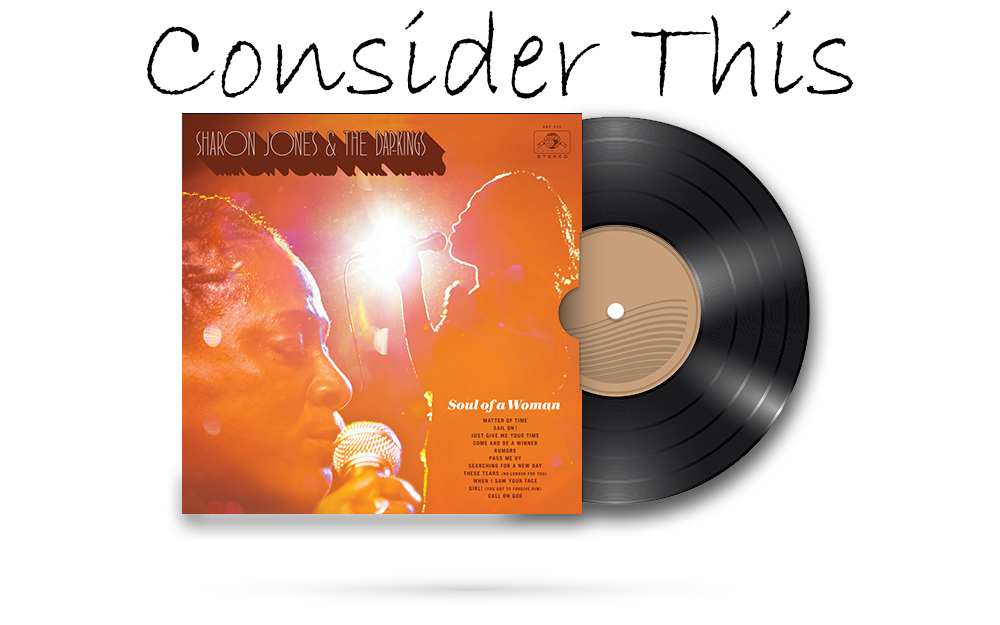
Eleni P. Austin
The last couple of years have been pretty brutal for Rock N’ Roll fans. At the outset of 2016 we lost Lemmy from Motorhead and then David Bowie. In the Spring we lost Merle Haggard, and quite shockingly Prince. Then that autumn, Leonard Cohen, Leon Russell and George Michael all passed away.
This year, we have grudgingly bade farewell to Chuck Berry, Gregg Allman, Chris Cornell, and Glen Campbell. Tragically and rather suddenly, Tom Petty died in October following a fatal heart attack. In the last couple of weeks Fats Domino, Malcolm Young from AC/DC and Power Pop progenitor Tommy Keene each left the building.
Although it wasn’t shocking, it was no less heartbreaking when Sharon Jones passed away in late 2016, following a valiant battle with Pancreatic Cancer. It seemed like she had been fighting her entire life to gain recognition for her exceptional talent. After finally attaining a modicum of success, her terminal illness dealt a bitter blow.
Sharon Lafaye Jones was born May 4th, 1956 in Augusta, Georgia. The youngest of six kids, her mother, Ella, also raised her deceased sister’s children. At an early age, Sharon and her siblings would sing and perfectly replicate the stage moves of Augusta native and Godfather of Soul, James Brown. She also discovered her protean vocal talent, singing in church choir.
Ella relocated the family to the Bedford Stuyvesant neighborhood of Brooklyn when Sharon was a teenager. She quickly immersed herself in the Funk and Disco styles that were quickly gaining traction in the early ‘70s. After graduating high school, she attended Brooklyn College. Continued accolades from her church choir motivated her to consider a career in music.
She entered talent shows hoping to receive a recording contract. That didn’t happen, but the industry took notice and she began getting session work. Known then as Lafaye Jones, she sang back-up vocals on myriad recordings, often times uncredited. To make ends meet she worked as a corrections officer at Rikers Island and an armored car guard for Wells Fargo bank.
Nearly 20 years into her career she received a big break in 1996 when she was singing back-up for Deep Funk legend, Lee Fields. The recording was organized by Gabriel Roth (ne’ Bosco Mann). The Riverside, California native relocated to New York to attend College at NYU. Barely out of school, he had already co-founded his first record label, Desco.
Gabriel was quick to recognize her outsize talent, and immediately began recording a series of singles with Sharon. She was also a featured vocalist on songs by up and coming Soul/Funk aggregates like the Daktaris, the Mighty Imperials and the Soul Providers. The latter two bands broke up and reconvened as the Dap-Tones around the same time that Desco Records dissolved and re-emerged as Daptone Records. Their inaugural release was the 2002 debut of Sharon Jones & The Dap-Kings entitled Dap Dippin’ With Sharon Jones And The Dap-Kings.
Critical praise was nearly unanimous. Through relentless touring and exposure in television shows and films, the band began to build a faithful following; three years later they returned with their sophomore effort, Naturally. It featured a burnished, slow burn take on Woody Guthrie’s alternative national anthem, “This Land Is Your Land.” One new fan who was paying close attention was producer Mick Ronson.
Originally a musician, British born Mark was raised in New York and counted Sean Lennon as one of his childhood friends. He signed on to produce second album from an up-and-coming British chanteuse named Amy Winehouse. Inspired by Sharon and the Dap-Kings’ sound, he tapped the band to back Amy on her now legendary Back To Black album. The record was a sensation and went on to win multiple awards, including three Grammys at the 50th ceremony in 2008.
Back To Black put the Dap-Kings on the map, now it was Sharon’s turn to display the original grit, grace and soul that had so inspired Amy. Their 2007 effort, 100 Days, 100 Nights, broke ground commercially, inching into Billboard’s Top 200. Released in 2010, their fourth record, I Learned The Hard Way, considerably upped the ante, debuting at #15 on the charts.
In 2013, Sharon and the Dap-Kings had already written and recorded what would be their fifth album, when she received devastating news. She had been diagnosed, initially with Bile Duct cancer and later stage 2 pancreatic cancer. The album and tour were delayed and she endured a liver operation and chemotherapy.
She didn’t put her life on hold for long, and began scheduling live shows in between chemo treatments. She defiantly refused to wear wigs as her hair fell out from radiation, playing several dates completely bald and beautiful.
In early 2014, she was pronounced cancer-free and Give The People What They Want was finally released. It received rave reviews along with their first Grammy nomination. A year later they recorded a Yuletide effort, It’s A Holiday Soul Party, and Sharon was the subject of award-winning documentarian Barbara Kopple’s film, “Miss Sharon Jones!”
It was during the screening of that film that Sharon revealed her cancer had returned. Even so, she re-entered the studio with the band, hoping her talent could out run her disease. Ironically, she suffered a stroke while watching the results of the 2016 Presidential election and a second one the following day. She remained lucid, even joking that outcome of the election caused the stroke. Eight days later she was gone.
Now a year and a day after her untimely passing comes her sixth album, Soul Of A Woman. The opening two tracks “Matter Of Time” and “Sail On” set the tone for this excellent effort. “Matter…” saunters out of the speakers with a syncopated slink. Rumbling bass lines connect with wily Farfisa notes, peppery brass and rattlesnake shake guitar. Sharon’s powerhouse vocals dart and pivot through the arrangement, aided and abetted by back up vocalists Saun & Starr (a.k.a. the Dap-ettes).
The lyrics seem to anticipate the divisive climate that clouds 2017; “It’s a matter of time before justice will come, just a matter of time before all wars will be done/It’s a matter of time before wrongs will be righted, it’s a matter of time before all people will be united.” As the instrumentation powers down she notes, “It’s a matter of time, this is a song about peace, just a matter of time before freedom means FREE!/Unity for all people, I can’t wait too much longer, my frustration’s at it’s end, I can’t wait ‘til I am stronger….”
“Sail On” opens with a soul-shaking cri de Coeur as Sharon’s vocals crest over the melody. The instrumentation kicks in and the arrangement is so tight you could bounce a quarter off it. The effect is positively thrilling. Rubbery bass lines and a rock steady beat add ballast to ricochet guitar riffs and pulsating horns. The lyrics spin out a tale of romantic comeuppance when an old beau turns up on her doorstep having fallen on hard times. She reminds him of his own cavalier behavior; “I don’t suppose that you recall when I came knockin’ at your door, you said ‘sail on.’” Given the same opportunity she turns the other cheek; “If I do to you what you did to me, tell me tell me, Where would we be/two people stranded without a helping hand, two people stranded, neither one a friend, come on in…you and me, we’re gonna sail on.”
The action slows on a couple tracks. “Just Give Me Your Time” opens with a brass salvo that recalls the melodrama of James Brown’s seminal “It’s A Man’s Man’s Man’s World.” Plucked guitar chords intersect with spiky horns and a tick-tock beat that turns on a dime. Here, Sharon unspools a laundry list of what she isn’t looking for in a man, insisting “I just need your time.”
On “Pass Me By” lush organ colors ebb and flow over crisp percussion and sweetly soulful guitar. Her vocals remain deceptively dulcet, silky and supple, as she artfully calls bullshit on an Ex’s excuses; “The cost of my love for you is getting too high, I’m going to save myself and say I think you better pass me by.”
Sharon Jones has always worn her influences on her sleeve, from Ella Fitzgerald and Motown, James Brown, Stax-Volt and Ike & Tina Turner, to Prince, Michael Jackson, Erykah Badu and Beyonce. Three songs here obliquely pay homage to the creamy Philadelphia International production of Thom Bell, Gamble & Huff and groups like the Delfonics and Stylistics, as well as the orchestral Soul of Barry White and Isaac Hayes.
On “These Tears (Are No Longer For You),” velvet-y strings and plush horns nearly cushion the blow as Sharon quietly lowers the boom on a selfish love. “These tears are no longer for you baby, I cried away the pain for so long, I sat there and played the fool/Farewell to what was wrong, No more do they belong to you.” As torchy as any Chanson from Edith Piaf, Sharon’s nuanced vocals are buttressed by Saun & Starr’s electrifying back-up vocals.
Propelled by stentorian French horn, cascading electric guitar, sawing strings and roiling timpani, the instrumentation and arrangement on “Girl! (You Got To Forgive Him)” might easily overpower a lesser singer, but Miss Jones simply nails it. She plaintively coaxes a friend to overlook her man’s myriad shortcomings, asking “are you going to let true love slip through your hands?”
Finally, “When I Saw Your Face” is slow and sultry, locking into a mid-tempo groove accented by fluttery strings and tart horns. As she ponders the authenticity of love at first sight, her powerhouse vocals are never flamboyant or showy, but simply lithe and agile. Saun & Starr match her note for note.
The best tracks here are “Rumors” and “Searching For A New Day.” The former is a brisk Afro-Cuban boogaloo that blends with biting Girl Group sass. Over sharp handclaps, prickly horns, chicken scratch guitar and a cutting conga rhythm, Sharon and the ladies interrogate a potential lover about his womanizing ways. It’s simply irresistible. (But not in a Robert Palmer way).
The latter, pivots on shang-a-lang guitar and a snapback beat that echoes the shimmery perfection of mid ‘60s Motown. On a quest for spiritual salvation and creative satisfaction the lyrics mirror her perseverance and formidable work ethic; “Through the hard times, can’t sit on the sidelines, you know we gotta get ahead/I’m gonna keep on tryin’.”
The album closes with “Call On God.” A stunning return to Sharon’s Gospel roots, it features churchy organ runs and rippling guitar riffs wrapped around thumpy insistent rhythm. It’s pure ecclesiastic testimony, as she puts her fate in God’s hands and recommends we do the same. “Just call, call on God, and he’ll be a friend/Just call on God and he will carry you through…he will provide, yes he will.” It manages to be simultaneously heartbreaking and comforting.
Although Sharon receives top billing, the Dap-Kings don’t just accompany her, they write, arrange and produce all the songs. The band includes Joseph M. Crispiano and Binky Griptite on guitars Cochema Gastelum and Neal Sugarman on saxophones, Homer Steinweiss on drums, Fernando Velez handles percussion, Dave Guy plays trumpet and Bosco Mann anchors the low end on bass. Listening to Soul Of A Woman is a beautiful and bittersweet experience. Sharon Jones is gone, but her talent continues to console us, temporarily assuaging our collective grief.









































